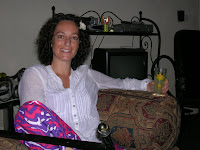 When I finally moved into my accommodation I realised that I was the Queen, as I had been given the most wonderful house to live in. Nigerian colleagues say that they have never seen such a house in Jigawa. So my house is nicknamed 'The Palace.' (It was even called a castle by one.)
When I finally moved into my accommodation I realised that I was the Queen, as I had been given the most wonderful house to live in. Nigerian colleagues say that they have never seen such a house in Jigawa. So my house is nicknamed 'The Palace.' (It was even called a castle by one.)Jenny and Simon, visiting from Kaduna, are enjoying a G & T on my well. . . until a cockroach came and sent us indoors. The banana tree behind them is apparantly too small to fruit this year. The TV doesn't work yet, but I'm told I just need to register. I have a huge disk in the garden so I can buy a card for more channels.



This lovely kitchen has running water, a large fridge, a huge freezer, and a larder. The larder reminds me of my childhood readings of Enid Blyton. I did have large furry visitors the last couple of nights though because I left a bag of flour on the worktop!
The house is large and fully furnished. The 3 double bedrooms all have onsuite bathrooms! (Imagine the bathrooms looking a bit run down like the kitchen.) It is amazing because so far my electricity supply has been very good (I think because I am in the posh area of town), I also have aircon and fans in all rooms. When the water stops flowing I press a switch in the garden and it pumps water from the well or this other sort of covered swimming pool water storeage, so I am supposidly never going to run out of water. . . although I am constantly expecting my water and electricity luck to end soon!
But the most wonderful thing about my palace is the garden. It is truely magical, full of trees, bushes, flowers and wildlife .
For the fruit trees alone, there are no less than 4 mango trees, 2 banana trees, grape vines, 3 date bushes, a pawpaw tree, 2 orange trees, plus many others that I haven't heard or tasted yet.
I even have a 'secret garden' in which you have to open the gate and duck under the arch. I have now bought chairs and tables which are under a thatched covering inside here. In here, you are hidden from anyone who enters the high walled and guarded compound :0)
To get to the kitchen I have to go outside through a little courtyard that has a delicious smelling jasmine tree.
At the moment I am living alone, but soon another VSO will come a join me - a man from Uganda.
PS - Check out the weather on the right hand side of the page: Harmattan has arrived, which is the season where the winds bring dust from the Sahara desert. It was very misty today with a light breeze.






